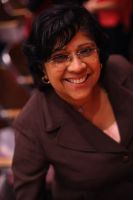Cléo Fatoorehchi interviews RADHIKA BALAKRISHNAN of the Centre for Women's Global Leadership
 Radhika Balakrishnan Credit:Courtesy of CWGL |
For two decades, women around the world have marked "Sixteen Days of Activism Against Gender Violence", which fall between the International Day for the Elimination of Violence Against Women on Nov. 25 and International Human Rights Day on Dec. 10.
From Argentina to Ghana, and Japan to Georgia, this year, women's groups worldwide are focusing on the linkages between militarism and violence against women.
For example, the incidence of rape in conflict areas has only increased in the past few decades, from 200,000 rapes in Rwanda in the early 1990s to over 250,000 in the Democratic Republic of Congo since 2003. According to the United Nations Development Fund for Women (UNIFEM), one out of three women has been raped, coerced into sex, beaten, or otherwise abused in her lifetime.
IPS correspondent Cléo Fatoorehchi spoke with the executive director of the Centre for Women's Global Leadership (CWGL), Radhika Balakrishnan, who is also a gender and women's studies professor at Rutgers University in the United States.
Q: Regarding civilian women raped by armed forces, do you think that increasing the number of women in armed forces could have a positive impact?
A: I think stopping rape is to stop the violence that the military is based in. So many of the women in the military have also been raped, so our advocating for increasing the number of women in the military might actually increase the number of women being raped. I think [the important thing] is to have a real education campaign amongst the men in the military about the impact of violence and the militaristic culture.
Q: Nevertheless, many argue that more women in peacekeeping and armed forces is the best solution.
A: No, I don't think it would be. I think we should have more women in peacekeeping, that is not a bad idea, but I don't think having women there is going to stop violence. Actually, it depends on what kind of power they have, what kind of role they have, what the reason is for being there. If the reason for being there is to work with women's organisations, to try to make sure that there is attention brought to this, yes, but just having de facto women there doesn't mean it is going to change.
And I think there needs to be a reconstructive effort to do education on the impact of militarism on violence, and to talk to peacekeeping forces and educate them on what it means to be there, and also so they can expose the level of violence against women. One of the things our campaign is trying to do is to really bring attention to how much violence actually takes place. And very few people actually talk about it.
Q: When you speak about education, what structures do you refer to?
A: I think everywhere. One of the problems with militarism is that it is a violent culture that is perpetuated, so we need to oppose militarism in the first place, because it is that culture that creates violence, but we also need to really bring much more attention to the issues of violence. I think it has to be in the school system, I think we need to really bring it out at a very local level.
Q: What do you think about quota systems, both in the economic and political spheres?
A: In India, there is a policy system in Parliament. On one level it works, but on the other level, it depends on how trained women are to participate politically, and not just sort of bring women for the sake of having more numbers. But there is a lot of education, training and empowerment, so that they can hold those political places, and have a voice and power, so that they can reinforce policies.
Just because women are in politics doesn't mean that they are going to do the right thing, they have to be the right women in politics, with the right ideas or education on where to go.
Q: What do you expect from the 55th session of the Commission on the Status of Women, taking place next February?
A: It is hard to say. The focus is on science, technology and education, and we are going to be very involved. One of the issues that we are looking at is the new agency, U.N. Women, and trying to really talk to that agency and influence what kind of issues they are going to work on. We want them to have a very strong part of U.N. Women to look at economic policy overall, and so that's one of the things we are going to be advocating for this session.
It is not just women being economically independent, but for women to be able to talk about economic policy. Not individual women, but that we can talk about macro policy, monetary and fiscal policy, the IMF [International Monetary Fund], we can talk about all the current international economic policies, which women are often left out of.
No comments:
Post a Comment